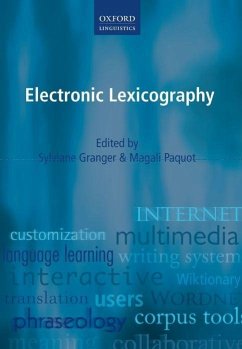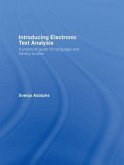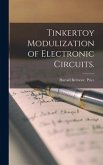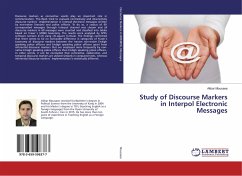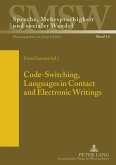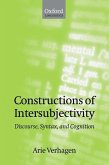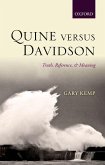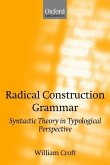Electronic Lexicography
Herausgeber: Granger, Sylviane; Paquot, Magali
Electronic Lexicography
Herausgeber: Granger, Sylviane; Paquot, Magali
- Gebundenes Buch
- Merkliste
- Auf die Merkliste
- Bewerten Bewerten
- Teilen
- Produkt teilen
- Produkterinnerung
- Produkterinnerung
Professional and academic lexicographers present and discuss innovations, ideas, and developments in all aspects of electronic lexicography including dictionary-writing systems and the integration of corpora for every kind of dictionary in every format.
Andere Kunden interessierten sich auch für
![Introducing Electronic Text Analysis Introducing Electronic Text Analysis]() Svenja AdolphsIntroducing Electronic Text Analysis202,99 €
Svenja AdolphsIntroducing Electronic Text Analysis202,99 €![Tinkertoy Modulization of Electronic Circuits. Tinkertoy Modulization of Electronic Circuits.]() Harold Belmont PriceTinkertoy Modulization of Electronic Circuits.37,99 €
Harold Belmont PriceTinkertoy Modulization of Electronic Circuits.37,99 €![Study of Discourse Markers in Interpol Electronic Messages Study of Discourse Markers in Interpol Electronic Messages]() Akbar MousaeeStudy of Discourse Markers in Interpol Electronic Messages35,99 €
Akbar MousaeeStudy of Discourse Markers in Interpol Electronic Messages35,99 €![Code-Switching, Languages in Contact and Electronic Writings Code-Switching, Languages in Contact and Electronic Writings]() Code-Switching, Languages in Contact and Electronic Writings49,25 €
Code-Switching, Languages in Contact and Electronic Writings49,25 €![Constructions of Intersubjectivity Constructions of Intersubjectivity]() Arie VerhagenConstructions of Intersubjectivity93,99 €
Arie VerhagenConstructions of Intersubjectivity93,99 €![Quine Versus Davidson Quine Versus Davidson]() Gary KempQuine Versus Davidson115,99 €
Gary KempQuine Versus Davidson115,99 €![Radical Construction Grammar Radical Construction Grammar]() William CroftRadical Construction Grammar442,99 €
William CroftRadical Construction Grammar442,99 €-
-
-
Professional and academic lexicographers present and discuss innovations, ideas, and developments in all aspects of electronic lexicography including dictionary-writing systems and the integration of corpora for every kind of dictionary in every format.
Hinweis: Dieser Artikel kann nur an eine deutsche Lieferadresse ausgeliefert werden.
Hinweis: Dieser Artikel kann nur an eine deutsche Lieferadresse ausgeliefert werden.
Produktdetails
- Produktdetails
- Verlag: Oxford University Press (UK)
- Seitenzahl: 532
- Erscheinungstermin: 29. Dezember 2012
- Englisch
- Abmessung: 241mm x 159mm x 38mm
- Gewicht: 944g
- ISBN-13: 9780199654864
- ISBN-10: 0199654867
- Artikelnr.: 35483860
- Herstellerkennzeichnung
- Libri GmbH
- Europaallee 1
- 36244 Bad Hersfeld
- gpsr@libri.de
- Verlag: Oxford University Press (UK)
- Seitenzahl: 532
- Erscheinungstermin: 29. Dezember 2012
- Englisch
- Abmessung: 241mm x 159mm x 38mm
- Gewicht: 944g
- ISBN-13: 9780199654864
- ISBN-10: 0199654867
- Artikelnr.: 35483860
- Herstellerkennzeichnung
- Libri GmbH
- Europaallee 1
- 36244 Bad Hersfeld
- gpsr@libri.de
Sylviane Granger is Professor of English Language and Linguistics and Director of the Centre for English Corpus Linguistics at the Catholic University of Louvain. Her current research interests focus on the integration of corpus data into a range of user-oriented tools, in particular electronic dictionaries and writing aids. Her latest publications include Phraseology: An interdisciplinary perspective (co-edited with F. Meunier) and International Corpus of Learner English (Granger et al. 2009). Magali Paquot is a research fellow at the Centre for English Corpus Linguistics, Catholic University of Louvain. Her current research interests focus on academic vocabulary, phraseology and pedagogical lexicography. Her latest publications include Academic Vocabulary in Learner Writing (2010) and A Taste for Corpora (co-edited with F. Meunier, S. De Cock and G. Gilquin, 2011).
* 1: Sylviane Granger: Introduction: Electronic Lexicography: From
challenge to opportunity
* part I: Lexicography at a Watershed
* 2: Michael Rundell: The Road to Automated Lexicography: An editor's
viewpoint
* 3: Adam Kilgarriff and Iztok Kosem: Corpus Tools for Lexicographers
* 4: patrick Hanks: Word Meaning and Word use: Corpus evidence and
electronic lexicography
* 5: Andrea Abel: Dictionary Writing Systems and Beyond
* 6: Sven Tarp: Theoretical Challenges in the trnsitionFrom
Lexicographical p-works to e-tools
* 7: Danie Prinsloo: Electronic Lexicography for Lesser-resourced
Languages: the South African context
* Part II: Innovative Dictionary Projects
* 8: Serge Verlinde and Geert Peeters: Data Access Revisited: The
Interactive Language Toolbox
* 9: Magali Paquot: The LEAD Dictionary-cum-writing Aid: An integrated
dictionary and corpus tool
* 10: Natalie Kübler and Mojca Pecman: The ARTES Bilingual LSP
Dictionary: From collocation to higher order phraseology
* 11: Marie-Claude L'Homme, Benoît Robichaud and Patrick Leroyer:
Encoding Collocations in the DiCoInfo: From formal to user-friendly
representations
* 12: Toma Tasovac: The Challenges of Wordnet-based pedagogical
Lexicography: The Transpoetika Dictionary
* 13: Christian meyer and Iryna Gurevych: Wiktionary: A new rival for
expert-built lexicons? Exploring the possibilities of collaborative
lexicography
* 14: Jette H. Kristoffersen and Thomas Troelsgård: The Electronic
Lexicographical Treatment of Sign Languages: The Danish Sign Language
Dictionary
* Part III: Electronic Dictionaries and Their Users
* 15: Anna Dziemianko: On the Usefulness of Paper and Electronic
Dictionaries
* 16: Robert Lew: How can we make Electronic Dictionaries More
Effective?
* 17: Hilary Nesi: Alternative edictionaries: Uncovering dark practices
* 18: Lynne Bowker: Meeting the Needs of Translators in the age of
e-lexicography: Exploring the possibilities
* 19: Pedro A. Fuertes-Olivera: On the Usability of Free Internet
Dictionaries for Teaching and Learning Business English
* 20: Carolin Müller-Spitzer, Alex Koplenig, and Antje Töpel: Online
Dictionary Use: Key findings from an empirical research project
* Bibliography
* Author Index
* Subject Index
challenge to opportunity
* part I: Lexicography at a Watershed
* 2: Michael Rundell: The Road to Automated Lexicography: An editor's
viewpoint
* 3: Adam Kilgarriff and Iztok Kosem: Corpus Tools for Lexicographers
* 4: patrick Hanks: Word Meaning and Word use: Corpus evidence and
electronic lexicography
* 5: Andrea Abel: Dictionary Writing Systems and Beyond
* 6: Sven Tarp: Theoretical Challenges in the trnsitionFrom
Lexicographical p-works to e-tools
* 7: Danie Prinsloo: Electronic Lexicography for Lesser-resourced
Languages: the South African context
* Part II: Innovative Dictionary Projects
* 8: Serge Verlinde and Geert Peeters: Data Access Revisited: The
Interactive Language Toolbox
* 9: Magali Paquot: The LEAD Dictionary-cum-writing Aid: An integrated
dictionary and corpus tool
* 10: Natalie Kübler and Mojca Pecman: The ARTES Bilingual LSP
Dictionary: From collocation to higher order phraseology
* 11: Marie-Claude L'Homme, Benoît Robichaud and Patrick Leroyer:
Encoding Collocations in the DiCoInfo: From formal to user-friendly
representations
* 12: Toma Tasovac: The Challenges of Wordnet-based pedagogical
Lexicography: The Transpoetika Dictionary
* 13: Christian meyer and Iryna Gurevych: Wiktionary: A new rival for
expert-built lexicons? Exploring the possibilities of collaborative
lexicography
* 14: Jette H. Kristoffersen and Thomas Troelsgård: The Electronic
Lexicographical Treatment of Sign Languages: The Danish Sign Language
Dictionary
* Part III: Electronic Dictionaries and Their Users
* 15: Anna Dziemianko: On the Usefulness of Paper and Electronic
Dictionaries
* 16: Robert Lew: How can we make Electronic Dictionaries More
Effective?
* 17: Hilary Nesi: Alternative edictionaries: Uncovering dark practices
* 18: Lynne Bowker: Meeting the Needs of Translators in the age of
e-lexicography: Exploring the possibilities
* 19: Pedro A. Fuertes-Olivera: On the Usability of Free Internet
Dictionaries for Teaching and Learning Business English
* 20: Carolin Müller-Spitzer, Alex Koplenig, and Antje Töpel: Online
Dictionary Use: Key findings from an empirical research project
* Bibliography
* Author Index
* Subject Index
* 1: Sylviane Granger: Introduction: Electronic Lexicography: From
challenge to opportunity
* part I: Lexicography at a Watershed
* 2: Michael Rundell: The Road to Automated Lexicography: An editor's
viewpoint
* 3: Adam Kilgarriff and Iztok Kosem: Corpus Tools for Lexicographers
* 4: patrick Hanks: Word Meaning and Word use: Corpus evidence and
electronic lexicography
* 5: Andrea Abel: Dictionary Writing Systems and Beyond
* 6: Sven Tarp: Theoretical Challenges in the trnsitionFrom
Lexicographical p-works to e-tools
* 7: Danie Prinsloo: Electronic Lexicography for Lesser-resourced
Languages: the South African context
* Part II: Innovative Dictionary Projects
* 8: Serge Verlinde and Geert Peeters: Data Access Revisited: The
Interactive Language Toolbox
* 9: Magali Paquot: The LEAD Dictionary-cum-writing Aid: An integrated
dictionary and corpus tool
* 10: Natalie Kübler and Mojca Pecman: The ARTES Bilingual LSP
Dictionary: From collocation to higher order phraseology
* 11: Marie-Claude L'Homme, Benoît Robichaud and Patrick Leroyer:
Encoding Collocations in the DiCoInfo: From formal to user-friendly
representations
* 12: Toma Tasovac: The Challenges of Wordnet-based pedagogical
Lexicography: The Transpoetika Dictionary
* 13: Christian meyer and Iryna Gurevych: Wiktionary: A new rival for
expert-built lexicons? Exploring the possibilities of collaborative
lexicography
* 14: Jette H. Kristoffersen and Thomas Troelsgård: The Electronic
Lexicographical Treatment of Sign Languages: The Danish Sign Language
Dictionary
* Part III: Electronic Dictionaries and Their Users
* 15: Anna Dziemianko: On the Usefulness of Paper and Electronic
Dictionaries
* 16: Robert Lew: How can we make Electronic Dictionaries More
Effective?
* 17: Hilary Nesi: Alternative edictionaries: Uncovering dark practices
* 18: Lynne Bowker: Meeting the Needs of Translators in the age of
e-lexicography: Exploring the possibilities
* 19: Pedro A. Fuertes-Olivera: On the Usability of Free Internet
Dictionaries for Teaching and Learning Business English
* 20: Carolin Müller-Spitzer, Alex Koplenig, and Antje Töpel: Online
Dictionary Use: Key findings from an empirical research project
* Bibliography
* Author Index
* Subject Index
challenge to opportunity
* part I: Lexicography at a Watershed
* 2: Michael Rundell: The Road to Automated Lexicography: An editor's
viewpoint
* 3: Adam Kilgarriff and Iztok Kosem: Corpus Tools for Lexicographers
* 4: patrick Hanks: Word Meaning and Word use: Corpus evidence and
electronic lexicography
* 5: Andrea Abel: Dictionary Writing Systems and Beyond
* 6: Sven Tarp: Theoretical Challenges in the trnsitionFrom
Lexicographical p-works to e-tools
* 7: Danie Prinsloo: Electronic Lexicography for Lesser-resourced
Languages: the South African context
* Part II: Innovative Dictionary Projects
* 8: Serge Verlinde and Geert Peeters: Data Access Revisited: The
Interactive Language Toolbox
* 9: Magali Paquot: The LEAD Dictionary-cum-writing Aid: An integrated
dictionary and corpus tool
* 10: Natalie Kübler and Mojca Pecman: The ARTES Bilingual LSP
Dictionary: From collocation to higher order phraseology
* 11: Marie-Claude L'Homme, Benoît Robichaud and Patrick Leroyer:
Encoding Collocations in the DiCoInfo: From formal to user-friendly
representations
* 12: Toma Tasovac: The Challenges of Wordnet-based pedagogical
Lexicography: The Transpoetika Dictionary
* 13: Christian meyer and Iryna Gurevych: Wiktionary: A new rival for
expert-built lexicons? Exploring the possibilities of collaborative
lexicography
* 14: Jette H. Kristoffersen and Thomas Troelsgård: The Electronic
Lexicographical Treatment of Sign Languages: The Danish Sign Language
Dictionary
* Part III: Electronic Dictionaries and Their Users
* 15: Anna Dziemianko: On the Usefulness of Paper and Electronic
Dictionaries
* 16: Robert Lew: How can we make Electronic Dictionaries More
Effective?
* 17: Hilary Nesi: Alternative edictionaries: Uncovering dark practices
* 18: Lynne Bowker: Meeting the Needs of Translators in the age of
e-lexicography: Exploring the possibilities
* 19: Pedro A. Fuertes-Olivera: On the Usability of Free Internet
Dictionaries for Teaching and Learning Business English
* 20: Carolin Müller-Spitzer, Alex Koplenig, and Antje Töpel: Online
Dictionary Use: Key findings from an empirical research project
* Bibliography
* Author Index
* Subject Index

